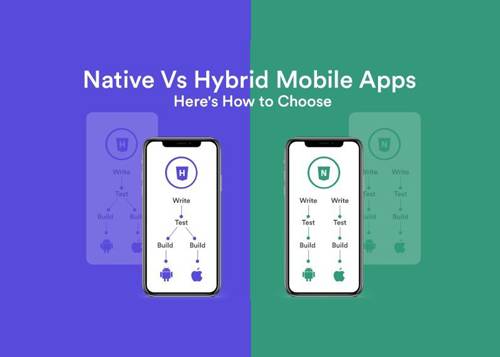An easy approachability towards the internet and smartphones has driven individuals to increasingly depend upon mobile applications for their day by day needs. Contrary to other electronic and computerized assistants, mobile phones are all around necessary gadgets because everything is accessible on them. The accessibility of financially savvy alternatives has prompted an expansion in dependency on mobile phones, consequently leaving engineers confused with regards to the Native VS Hybrid application development wrangle.
Mobile App Usage in Smartphone:
Selecting a methodology for mobile application development is an intimidating piece of work. Various factors come into the image here, just like time frame, development cost, simplicity of support, etc. Be that as it may, in case you’re in it to win it, what makes a difference the most is application execution and how It assists with drawing out a great user experience.
So, let’s get started with the introduction now.
What does it mean by Native Application?
A mobile application that is built using a programming language that chips away at a specific operating system, hardware, and programming framework is known as Native Application.
Native apps for iOS are created using Swift, iOS SDK, and Objective C, while, Native apps developed for Android are written in Java/Kotlin and Windows Phone uses C#, Visual Basic and XAML. In the event that you build up an application for iOS mobile, it won’t work for Android or Windows gadgets and the other way around.
Benefits of Native Application
- Fast with great execution.
- Supports HD games, activities, and graphical applications very well.
- In-built and quite intuitive.
- Using Native SDK, platform features like camera, schedule, amplifier, etc can be easily utilized.
Drawbacks of Native Application
- Development is quite expensive and monotonous since different groups take a shot at each application version.
- As the code base is distinctive for each stage so it might be difficult to execute comparative functionalities on each application version.
- Releasing applications on different platforms is a bit of a challenging task since each one poses various troubles for the developers.
- Support expenses may be higher as different applications run on various platforms.
What does it mean by Hybrid Application?
Hybrid applications are a combination of both the components of native and web applications that are fabricated utilizing HTML 5, CSS and JavaScript wrapped in a Native container.
It permits developers to compose the code once for the mobile application and can further actualize it to different platforms.
There are numerous tools available that are used for hybrid app creation. Some of them are listed below:
- React Native
- Xamarin
- PhoneGap
- Ionic
- Flutter, etc
Benefits of Hybrid Application
- A single hybrid application supports all the platforms.
- Development of Hybrid apps is easier because it uses Javascript, HTML, and CSS.
- The development process is financially savvy and also takes less time.
- The maintenance cost is also less as just a single app has to be maintained.
Drawbacks of Hybrid Application
- Slower execution with moderate usage.
- As it depends on modules, you might not be able to include all of the built-in features.
- Needs an internet association for specific functionalities.
- 3D, HD games, and graphical applications probably won’t work as easily as they do on Native applications.
- Customization may be tedious and expensive.
This is a never-ending debate among engineers, endeavors, and tech-specialists; the decision among native and hybrid applications has been a troublesome one.
However, one has to decide Which One to Consider for their Business?
As a matter of fact, it completely relies upon the nature of your business the projection one has for their own app, business aspirations, and the expectations of the target market.
It doesn’t matter to your users whether the app is Native or Hybrid, what matters is the user experience, which is also an essential factor in determining the success of your mobile app.
Conclusion: How to Make Your Decision?
Clearly, there is no end to the hybrid vs. native apps debate, and with the gradual emergence of web apps, mobile app developers have a lot to choose from.
Given the numerous factors mentioned in this blog, choosing between the two might be a complex decision to make. However, to make the right choice, it is essential to understand both the frameworks with their pros and cons.
Also, make sure you collaborate with the best mobile app development partners just like Ariel Software Solutions who can offer and advise you on the ideal solution for your business needs.
For any queries and suggestions, please feel free to get in touch. We are here to help you and would be glad to offer you the best solution.








